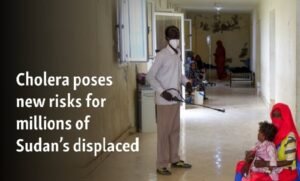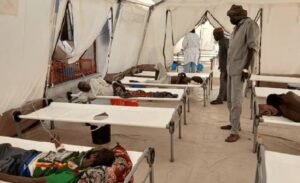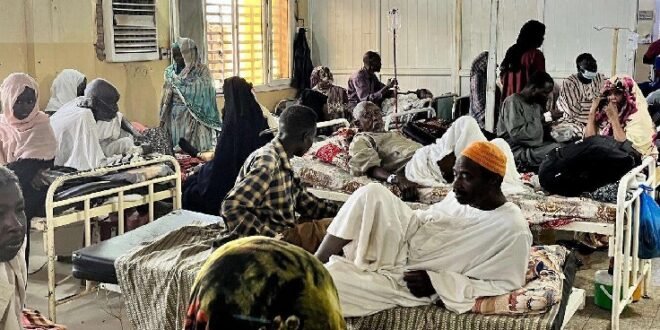25-09-2025
KHARTOUM: In the corridors of Omdurman Hospital in Khartoum, Sudan, the corridors have turned into a makeshift ward for patients with dengue fever amid an outbreak of the disease spread by mosquitoes.
The ongoing rainy season has created the ideal breeding ground for the disease to spread, with thousands of cases reported.
 At one of the few extensive medical facilities in the capital, Mohammed Siddig, a patient, explained that he felt the symptoms of dengue fever two weeks ago and was tested at a nearby health centre.
At one of the few extensive medical facilities in the capital, Mohammed Siddig, a patient, explained that he felt the symptoms of dengue fever two weeks ago and was tested at a nearby health centre.
“I was referred to a hospital and they couldn’t treat me, so I was brought to Omdurman Hospital,” Siddig told Al Jazeera but after nearly two and a half years of fighting between the Sudanese Armed Forces (SAF) and the paramilitary Rapid Support Forces (RSF), Khartoum is trying to rebuild.
According to Sudanese authorities, almost half of the hospitals in the capital have been destroyed by the war. The war, which began in April 2023, has resulted in waves of ethnically-driven killings, mass displacement and what the United Nations has referred to as the world’s worst humanitarian crisis.
Abdul Rahman Abdalla, whose brother is being treated at Omdurman Hospital, told media that there is “no improvement” in his condition.
“(He’s) only been given IVs and we don’t see any improvement,” he said.
In just one area of the capital, more than 5,000 cases of malaria, typhoid and dengue fever, accompanied by dozens of deaths, have been reported in the past month.
The rise in cases is putting a strain on Sudan’s health centres, during a time when thousands are returning to the capital. Alongside the congestion in hospitals, the shortage of medical supplies has forced some to seek alternative treatment.
 In Khartoum North, Mohamed Ali returned to his home after SAF retook the capital in March. While he tested positive for dengue fever and malaria, Ali opted for home remedies over medical treatment.
In Khartoum North, Mohamed Ali returned to his home after SAF retook the capital in March. While he tested positive for dengue fever and malaria, Ali opted for home remedies over medical treatment.
“I got tested at the health centre in another district because the one in our district is not properly equipped. I was only able to get treatment for malaria, so I decided to take my medicine at home. I’m also taking traditional remedies because it’s faster than waiting at the hospital,” Ali told media.
However, aid organizations have warned that the caseload of those testing positive for the diseases is likely to increase but with hospitals struggling and a lack of medical supplies, organizations fear an increase in deaths.
The toll of the war in Sudan goes far beyond damaged infrastructure and lost lives, it has inflicted deep wounds on the dignity of its people. Families are torn apart, healthcare systems lie in ruins, and routine medical care has become a distant memory. The conflict has turned everyday survival into a monumental challenge; civilians face violence, displacement, hunger, and illness without access to even basic health services.
This unfolding tragedy not only undermines the past sense of normalcy but also erodes hope. The inability to care for the sick and vulnerable assaults the core of human dignity. Hospitals have been attacked, clinics looted and occupied, and health workers have either fled, been threatened, or paid with their lives. These are not just physical injuries, this is a psychological blow to a nation’s spirit.
Over the past two years, the war between the Sudanese Armed Forces and the Rapid Support Forces has turned critical portions of the health system into ghost towns. Almost 38 percent of health facilities have been rendered nonfunctional, and just 14 percent of hospitals still operate at full capacity, according to assessments by the World Health Organization’s HeRAMS monitoring program. (Int’l Monitoring Desk)
 Pressmediaofindia
Pressmediaofindia




